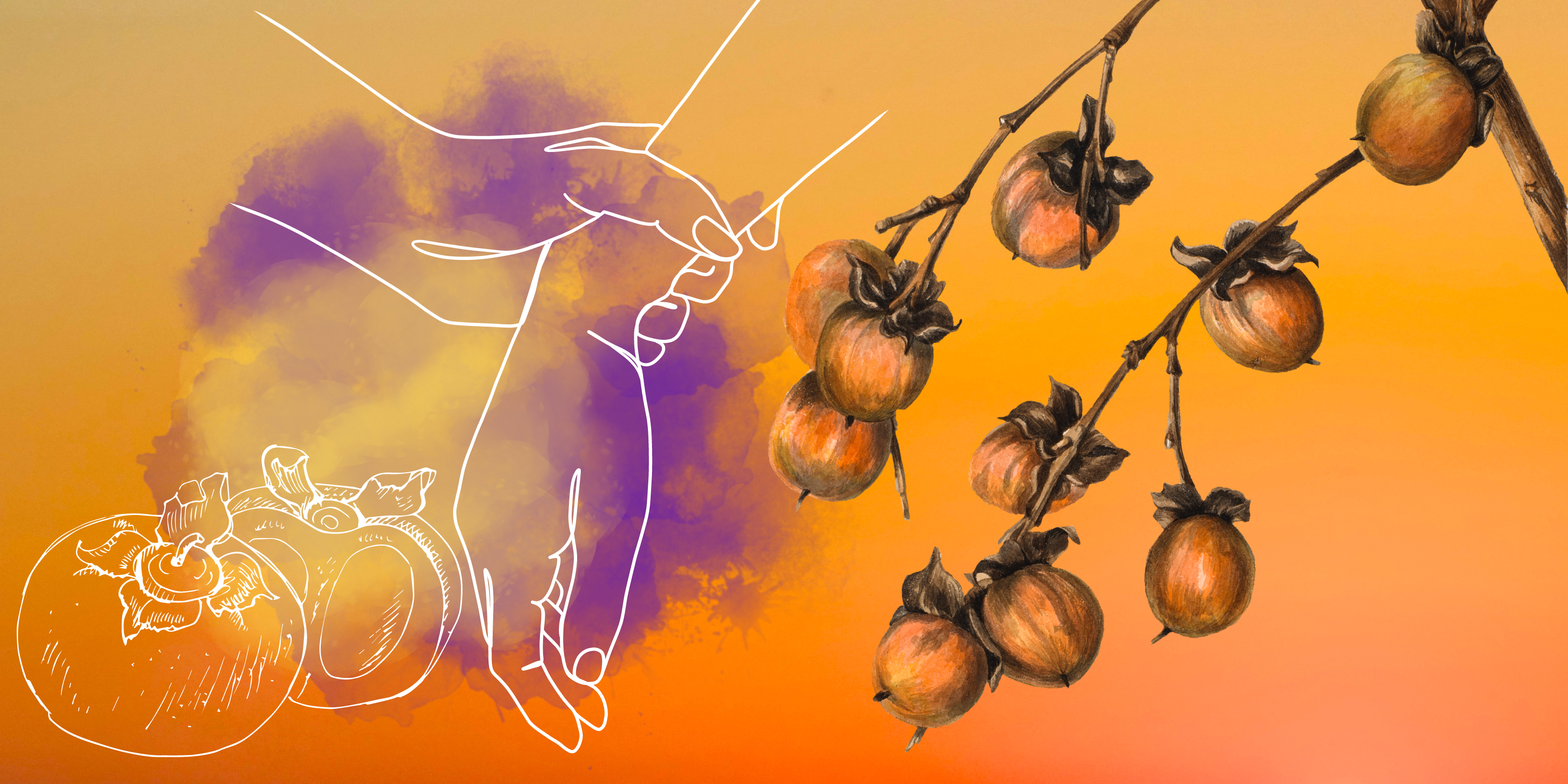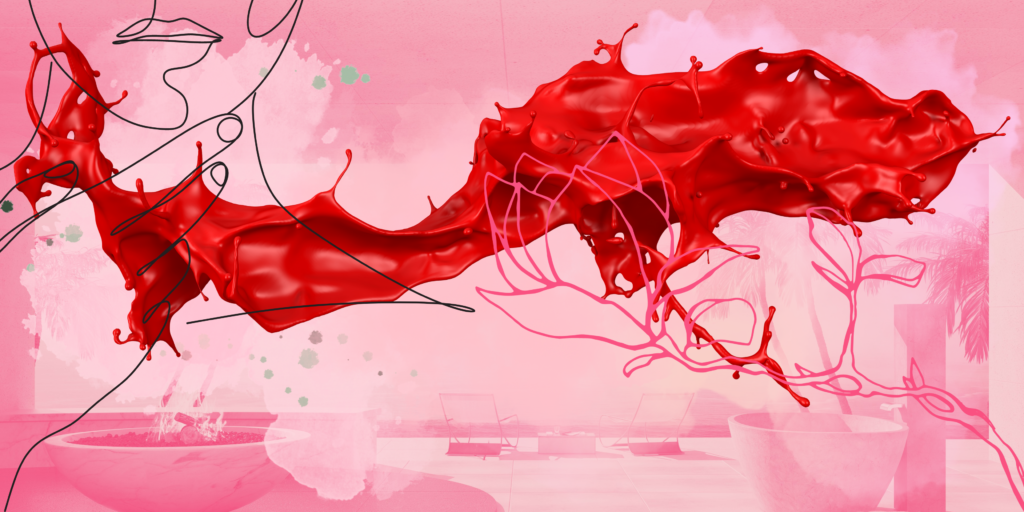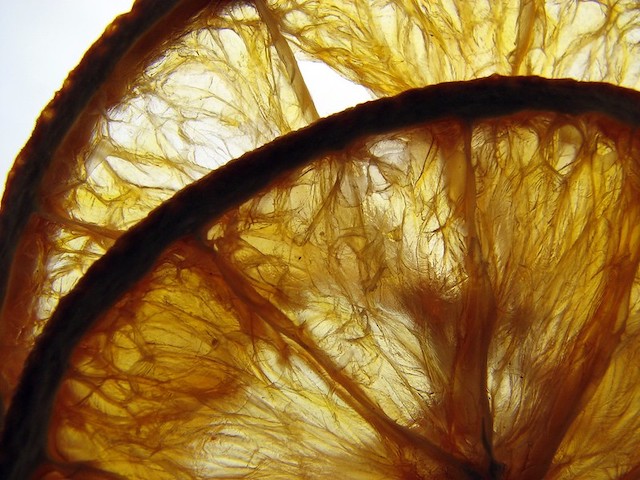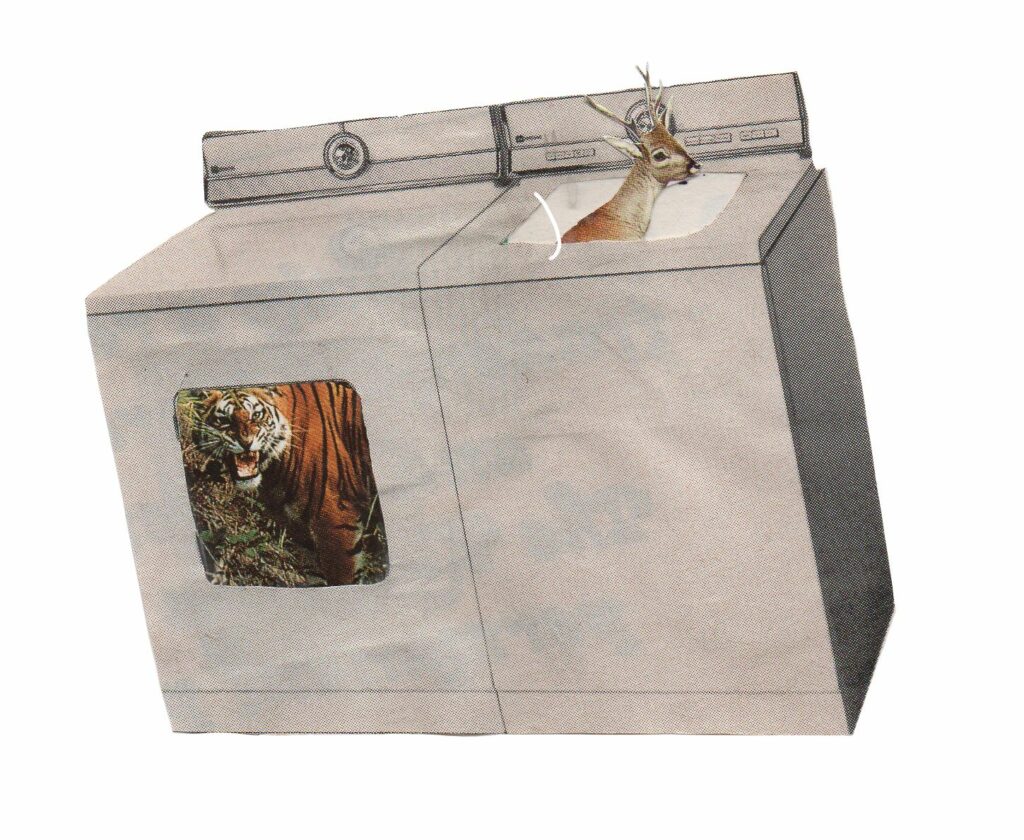If reincarnation is real, let me return a persimmon tree.

April 7, 2023
If reincarnation is real, I pray I return a persimmon tree. Mother says we don’t believe in that nonsense anymore, but who needs belief when it comes to dreams and heat and breath? If reincarnation is real, let me return a persimmon tree.
When no one is looking, I swallow a seed. To be safe, I swallow three. (Three living siblings. Three buried siblings. Three women keeping me alive—mother, grandmother, sister.) A few days later, I find a small lump in my arm floating just below the surface of my skin. It’s missable—the size of a pebble brushed off my knee after a fall. But on nights like these, Father says to take inventory: two soft palms, two cold ears, one small foot in a black shoe, the other in a pink. A single seed burrowed underground with me.
By the time the sirens call us to relief outside, my skin is pinched raw and tight. My brother, cradled in my grandmother’s arms, screams again, woken twice in a single night. Only when voices crowd his mouth and drown him out does the bunker warm with light.
Aboveground and out of our mother’s earshot, I press my sister’s fingers against my flesh. I ask her to bury me beside a river.
“That’s not a seed,” my friend says, drawing her hand away.
“How do you know?” I ask, small bruises ripening as I search again.
She leans against the branches behind her, puckered green plums spilling into her dark hair. “Because that’s not how seeds work. That’s not how eating works.”
I point to the basket of rice cakes—to be sold in the coming hours to the men with flat hats and guns—lying on the ground below us. “So what would happen if you ate all that?”
“I’d be happy.”
“No. What would happen to your body?”
“I’d be full?”
“You’d get soft and round.”
“Okay.”
“Okay.”
She pauses, a plum pressed against her summer-dampened mouth. “Well. Yes, okay, so what about it?”
“So that means this could be a seed.”
“How does—”
I catch her arms before she can fall out of the tree, her laughter more scattered than the sunlight dappling her cheeks. She throws the plum at my face.
“The cake doesn’t go into your skin,” she cries.
Still. I decide that persimmon trees and I have much in common. For one, we’re both skinny and twisted. Mother criticizes me for the former.
“People must think I’m starving you,” she says. “Are you not ashamed?”
My friends—our bodies bare and dancing in the river after school—tease me for the latter.
“A back as bent as the Hangang,” they laugh, throwing a fallen, sodden leaf at my spine. (I pull them under the water, braids untangling in the current.)
Then there are the colors. Autumnal colors. The colors of my favorite hanbok. Of candy smuggled home after work—sealed in an envelope Father had made and stamped with my name.
Orange and yellow and green. Good colors. Strong colors. Melts-the-snow-and-tastes-of-sugared-spices-thrown-in-the-fire colors.
“So what if you threw one into the water?” my friend asks.
“What?”
“A dried persimmon.”
“Why?”
“Pretend it’s you. When you’re older.”
“Wrinkly?”
“Yes—no. Dead.” She draws one from her basket. “This has a seed. And you…”
“Also have a seed. Yes.”
“Fine. Do you think it will grow?”
I take the persimmon from her hand. “Will you believe me if it does?”
We crouch beside the pond, the persimmon round, brown, dusted with white. I turn it once, twice, press a prayer into its skin and, through powdered lips, whisper goodbye. I close my eyes as it falls, and it sinks below in silence.
Now linger a moment, in that silence. Watch as the colors spill into the sea. Watch the ocean turn green. Watch the waves as they hit the boat paddling away, my brother—not me—strapped to the back of my grandmother. I think of my father, seafoam and bile washing over my feet.
Father of mulberry, stone, and dye. Sending us first into safety and trailing a few days behind. Paper mill shuttered closed by bandaged hands, sheets to sell pressed against his chest.
Linger too long, and watch as he, too, falls into the sea. Watch his body sink, and the paper float—for a moment, the ocean green cut by squares of blue, pink, red, and brown. Then red to orange. Orange to yellow, yellow to dye bleeding, pale scraps soaked and masticated by the waves. Jogakbo tides rolling, laying my father to rest.
“So did anything grow?” she asks.
If I summon a god, will he retrieve my father for me? Will he offer me three? The old one made of paper and stone—and here, a silver one. A gold one, as well.
Will this god hear me? Listen to me. Let me blush under the glare of the sun, but never sweat. Crowned in colors untouched by the sea, limbs pressed and stretched.
Let me wander—break through the earth in the cool, dark damp of the mud until I find another world that echoes this. A world of fairies bathing in lakes, goblins in caves. Rivers whose beds hold not my father, but dragons and gods gifting axes of silver and gold.
Let me return a persimmon tree.
On the tide of the wind, my voice will bear a child to sleep. In the whisper of leaves, she will hear the tales I found buried deep—the ones forgotten and lost to me. She will never know a world of orange and green beyond the furthest reaches of my own leaves. A child will find her shelter in me. And only the dust will gather in the bunkers below when I am—are you listening—a persimmon tree.



